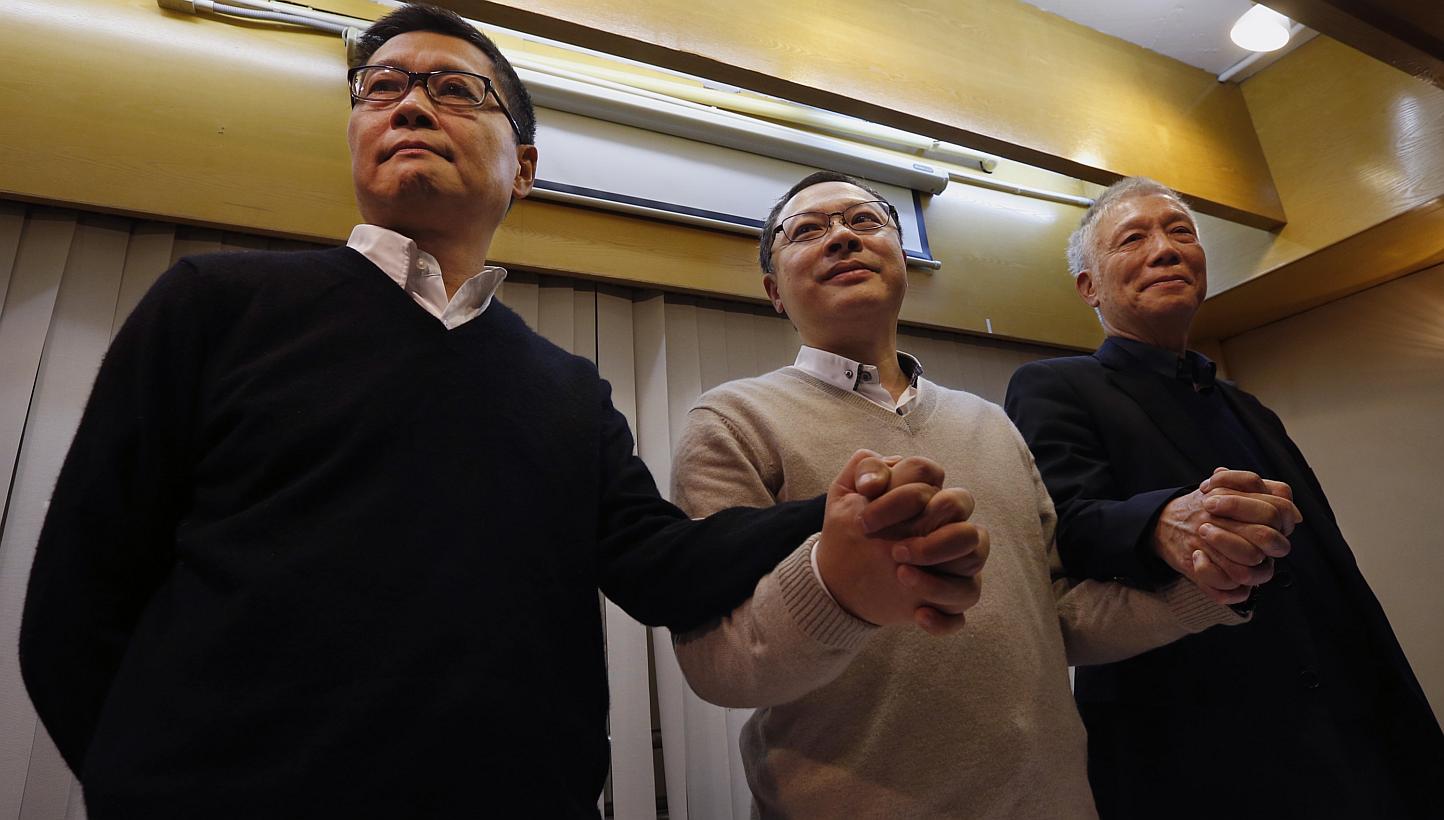Hong Kong protests: Trio of Occupy organisers surrender to the police, likely to be charged
Sign up now: Get insights on Asia's fast-moving developments

Hong Kong's original Occupy organisers Benny Tai (centre), Chan Kin Man (left) and Chu Yiu Ming joining hands during a news conference on their voluntary surrender to the police, on Dec 2, 2014. -- PHOTO: REUTERS
The original trio of Occupy organisers surrendered themselves to the police on Saturday, and are likely to be charged with inciting, organising and participating in an unauthorised assembly.
This is even as Chinese Vice-President Li Yuanchao warned that "the battle" with the Occupy movement and "the forces behind it" has not concluded.
"The interesting show is yet to come," he was reported to have said in Beijing on Wednesday.
Occupy co-organiser and civil society academic Chan Kin Man told The Straits Times that the police had informed their lawyers that they will be slapped with the three charges. If found guilty, the organisers could be jailed for up to five years for each.
The trio - besides Dr Chan, the other two are law academic Benny Tai and Baptist pastor Chu Yiu Ming - will plead guilty to the charges of participating in and organising an illegal assembly but not to the last charge of inciting it, said Dr Chan.
"It was not us who incited the assembly; it was the use of tear gas that led to people gathering on the roads," he argued, in reference to the police's actions against protesters on Sept 28 that sparked widespread anger and led to more people turning out in public. "So we certainly will not plead guilty to that."
The three men first lit the fuse for the city's historic civil disobedience campaign two years ago by coming up with a plan to paralyse the financial district of Central, in a bid to pressure Beijing for more leeway for Hong Kongers to directly elect their chief executive in 2017.
This later evolved into the massive Occupy movement last autumn, spearheaded by students and which saw major roads in Admiralty, Mong Kok and Causeway Bay occupied for 79 days.
Accompanied by supporters, the trio reported to the Wan Chai police station at 10am on Saturday morning, where they are expected to be questioned and arrested. It is not clear if they will be charged on the same day.
Law professor Simon Young of the University of Hong Kong said it is unlikely that will happen, as the police needs to get advice from the Department of Justice (DOJ) "in such cases involving public order".
"Usually the police will go ahead with the charges. But it would be a policy to check with DOJ in such cases because it involves issues of human rights and they would want to be sure of the legal position."
The latest development follows a spate of arrests the past two weeks, which saw key figures such as student leader Joshua Wong and Apple Daily founder Jimmy Lai voluntarily going to the police before being released without charge.
Police commissioner Andy Tsang had said in the middle of last month that investigations will focus on "principal instigators" and will be completed within three months.
Since the end of the Occupy movement on Dec 15, the political impasse in Hong Kong has only deepened, with Beijing seemingly looking to tighten its grip on the city.
In remarks made to the All-China Federation of Returned Overseas Chinese in the capital, Mr Li said that while the central authorities, the Hong Kong government and the "patriotic" camp have achieved a level of success at this point, more will need to be done including in "drawing lessons and warnings" from the involvement of young Hong Kongers in the movement.
Recent weeks have seen Beijing loyalists and Hong Kong Chief Executive Leung Chun Ying warn of "separatist sentiments" among students, reviving concerns that efforts to reintroduce a national education programme - which critics deride as "brainwashing" - in schools could be underway.
Of even greater fear within the pan-democrat camp is the possibility that a controversial national security law under the Basic Law's Article 23 could be enacted, as Beijing and Mr Leung maintain that "foreign forces" helped finance and support the Occupy movement. Some Beijing loyalists have suggested that the mainland's national security laws could be applied to Hong Kong.
Legislators meanwhile continue to dig their heels in, vowing that they will not pass any proposal based on the national legislature's framework that will make it all but impossible for a pro-democracy candidate to run for election.
xueying@sph.com.sg

